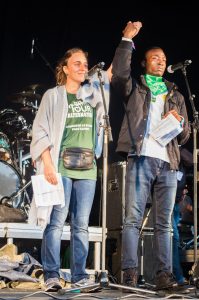By Jason Nardi
Under the pouring rain, the city of Bayonne (in the French Basque country) is nonetheless beautiful and full of life: on Sunday 7th of October the “Alternatives Village” was all over the old town, with hundreds of people in the streets and squares dedicated to many of the existing “alternative” practices – most of them if not all we can say Social Solidarity Economy – that today are not only possible but being done and used by more and more people. Collective Renewable energy solutions, shared mobility (the symbol of Alternatiba is a tandem bicycle – and the bicycle tour that involved thousands of people throughout France, Switzerland and Belgium a success, arriving in Bayonne on the 6th), food agroecological production and collaborative distribution, the Eusko social currency (with both its paper and electronic version) and ethical banking, but also community and cooperative housing, a strong eco-feminist presence (in streets and debates) and a special attention to the migration crisis, brought to us by the current dominant “growth” economy and the climate change that it engenders.
The latter was the main underlying theme of this Festival, started 5 years ago in Bayonne by the citizens group Bizi, full of “normal” and young people, families, and of course activists – who debated together with a rich program (https://alternatiba.eu/2018/10/programme-du-weekend-d-arrivee-du-tour-alternatiba/) as well as cultural and artistic events. While the urgency of a radical, systemic change was clearly perceived by all participants, the convivial and festive atmosphere gave much hope and renewed energy. Saving the Planet is no longer an option – now is the time to engage: “change the system, not the climate”.
Extract from the article Climate: 15,000 people in Bayonne for the release of the IPCC 1.5°C report
More than 15,000 people joined Bayonne this weekend for a major climate campaign. The two days marked by the arrival of the Tour Alternatiba, a gigantic village of alternatives, conferences and an atmosphere of popular emulation ended with a manifesto to initiate the immediate metamorphosis of the territories. Among them, nearly 200 personalities, scientists, political and associative leaders, artists, former ministers. In a duplex from South Korea, Valérie Masson-Delmotte, a member of the IPCC scientific committee, gave the public gathered in Bayonne the first opportunity to adopt the 1.5°C ratio and encouraged the continuation of citizen actions such as the Tour Alternatiba.
On the eve of the release of the IPCC 1.5°C report, Bayonne delivered a strong message. The final manifesto, read by Gaby, a young high school student from Poitiers and Moriba, a young Guinean saved from drowning by a maritime rescue boat while crossing the Mediterranean, both sixteen years old, launched a vibrant appeal for the immediate metamorphosis of our territories.

With nearly 50 conferences (attended by 6263 people) on such fundamental issues as the current government’s climate and energy transition assessment, obstacles to transition, economic relocation, transition financing, transport, renewable energies, solidarity and climate justice, this weekend also contributed to the ongoing discussions. Concrete alternatives such as the 100% renewable electricity supplier Enercoop or the eusko, already Europe’s leading local currency in terms of volume of currency in circulation, which passed the 1 million euskos mark that same weekend, have demonstrated the possibility that alternatives have to change scale.
This civic effervescence in Bayonne reflects what was observed during the 4 months of the Alternatiba Tour, where a total of more than 77,000 people showed their determination to take action to make a real difference. Under the guise of a great popular celebration, Alternatiba 2018 has once again confirmed that the crucial challenge of the fight against climate change is not only a vital challenge that tens of thousands of citizens are ready to take up, but also the foundation for more sustainable and desirable societies.
Text of the Manifesto (in French) here.
Videos and photos here.














